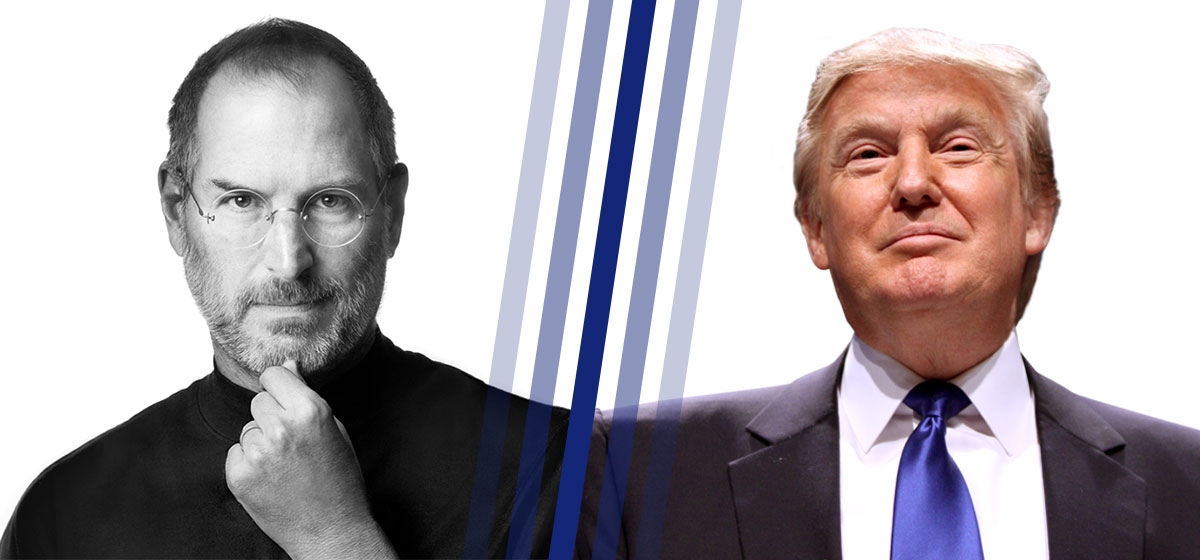Explaining Donald Trump, Part IV

There is so much emotionalism about Donald Trump—both pro and con—that I’m trying to explain his behavior by looking at issues outside the man himself. I’m looking at how people behave who have very similar personality types (i. e., mega entrepreneurial personalities, or MEPs) and at how people are likely to fare in the Presidency if they, like Trump, have never held elective office. In particular, I’m looking at people who share both those traits.
Continuing in that vein, I want to analogize Trump’s tribulations to those of a similar personality, the MEP we know as Steve Jobs. Jobs died in 2011, but his life is pretty much an open book because of the prominence of the companies he founded or influenced: Apple, NeXT, Pixar, Apple again.
The analogies between Jobs and Trump begin with the fact that, like Trump, Jobs was a major MEP. He could be brilliant and he could be insufferable, and the ratio of accomplishment to lunacy changed over time. Jobs never ran for office, but he ran, or tried to run, four companies (counting Apple twice). That’s not the same as trying to run a country, but Jobs’ tribulations are highly suggestive. Since Pixar was a kind of sideline, something for Jobs to do to keep himself busy, I’ll focus on Apple and NeXT.
Apple I
Jobs’ first iteration was as the co-founder (with Steve Wozniak) of Apple Computer back in 1977. Jobs was only 22 years old and, even in his own mind, wasn’t ready to be CEO of a rapidly growing tech company. In fact, Jobs’ role at Apple was mainly as the head of the Macintosh development team. Apple had other projects—the Apple I, the Apple II and the Lisa—and a separate CEO. It had a board consisting of strong, experienced outsiders. In that environment Jobs accomplished a lot. The Mac turned out to be an iconic product and a technological and commercial success. Ultimately though, even with all the adult supervision around, Jobs eventually became so disruptive that, in 1985, he was forced out of his own company.
NeXT
Following his ouster from Apple, Jobs vowed not to make himself vulnerable again. He founded NeXT Computer in 1985 and, unlike Apple, where he had toiled well down in the hierarchy, at NeXT Jobs was owner, chairman of the board, and CEO. He held total power and no one was in a position to reign in even his most bizarre ideas or behavior. The result, on the one hand, was some terrific technology: parts of the NeXT operating system are used in the Apple OS to this day. On the other hand, NeXT was a commercial disaster, as we can judge by merely one statistic (supplied by Isaacson in his bio of Jobs): NeXT/Jobs built a pristine, incredibly expensive, state-of-the-art factory designed to churn out 10,000 NeXT computers every month. Unfortunately, NeXT never sold more than 400 computers/month.
Apple II
In 1997, with Apple floundering badly, Jobs returned to the firm he had founded. Now in his early forties, Jobs hadn’t exactly mellowed—his MEP personality was still way, way out there—but he had matured. He had married a strong woman and had a family, and the failure of NeXT had been a sobering experience.
What does it mean to say that a MEP, whose many outsized personality characteristics include some normally associated with bratty children, has “matured?” In Jobs’ case, it meant that he had learned to focus on what was important and to leave everything else alone. When he returned to Apple, the firm produced dozens of products, most of them unimpressive, and Jobs ruthlessly concentrated Apple’s attention on a small handful of products where it could excel. This required terminating thousands of employees, some of whom received Jobsian summary executions—they were publicly fired at the end of a long tirade about what bozos they were.
Similarly, Jobs’ reality distortion field was still firmly in place, but it now had holes in it. Jobs would insist on some initiative that was plainly stupid or impossible, then eventually come around to reality but without ever admitting he’d been wrong. “I’m sick of arguing with you a**holes,” he would say. “Do whatever you want.” In other words, Jobs didn’t stop being an MEP, but he stopped being a scattered MEP whose sometimes bizarre behavior disrupted the entire firm.
If an MEP is an MEP is an MEP, which is true, why does it matter that the MEP has matured and learned to focus on a few things that really matter? First, it means that everything else in the company—or in the country if you’re an MEP who happens to be President of the U.S.—can operate normally, without being constantly unsettled.
It means, second, that the MEP is more likely to control his worst impulses because he is paying intense attention to the things that matter to him. During his first stint at Apple, Jobs certainly caused a lot of upheaval for the Mac project team, but not enough to prevent it from developing the Mac. It was his disruptive behavior throughout the firm that led to his ouster.
But in his second stint at Apple, having matured and learned to focus, the results were spectacular. In the course of just a few years, Apple turned out the iMac, the iPod, iTunes, the IPhone, and the iPad, a burst of corporate creativity almost unknown in the annals of business. During and shortly after the Tech Bust, Apple’s stock fell to roughly $6/share. But in 2011, just before Jobs died, it touched $400/share. It doesn’t get much better than that.
I’ll take a look at Trump’s Presidency—so far—in this context next week.
Next up: Explaining Donald Trump, Part V





